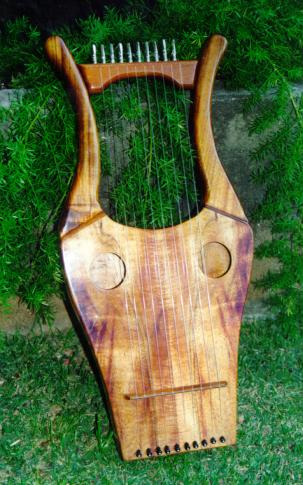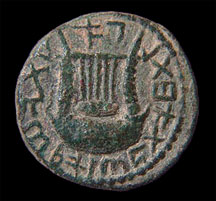Sunday, October 8, 2006 
Psalm 98:5
Sing praises to the LORD with the lyre,
with the lyre and the sound of melody.
Prayer
Thank You, Gracious God, for the "lyre." Thank You for the gift of music. How wondrously music lifts our souls before You. It gives life to our words of praise. It joins our hearts and our minds. Through music we are able to praise You with heart, soul, mind, and strength. It gives us the freedom to sing, to shout, even to clap or dance. Music loosens our voices and inspires our hearts.
Music also binds us all together in our worship. When we sing, our voices agree, both in words and tones. Music helps us to worship You as one people, with one heart.
Thank You, dear Lord, for those who lead worship in our churches. [Take a few moments to mention these people by name.] Thank You for their skill and talent, for their practice and preparation. Thank You most of all for their love for You, and for the way that love touches us and encourages us to adore You.
May the music of Your people give You joy this day, dear Lord! All praise be to You!
Postscript
Psalm 98:5 tells us to sing praises "with the lyre." The Hebrew original of this phrase uses the word kinnor. Interestingly, this word seems to have come from an Indian word kinnara, which was imported into Hebrew by way of Hittite, an ancient Semitic language. The kinnor was a harp-like instrument, with a wooden frame and ten strings (usually). It is the first musical instrument mentioned in the Bible (Gen 4:21). It was used in both secular (Gen 31:27) and sacred contexts. Even today, in many of our churches, musical worship is accompanied by stringed instruments (pianos, guitars, etc.).
In 1 Samuel 16:23, David, the future king, is said to play the kinnor with his hand. The first-century Jewish historian Josephus attributes the invention of instruments, including the kinnor, to David, though he believes the kinnor (translated below as viol) was played with a bow (or plectrum, a sort of pick).
And now David being freed from wars and dangers, and enjoying for the future a profound peace, composed songs and hymns to God, of several sorts of meter; some of those which he made were trimeters, and some were pentameters. He also made instruments of music, and taught the Levites to sing hymns to God, both on that called the sabbath day, and on other festivals. Now the construction of the instruments was thus: The viol was an instrument of ten strings, it was played upon with a bow; the psaltery had twelve musical notes, and was played upon by the fingers; the cymbals were broad and large instruments, and were made of brass. And so much shall suffice to be spoken by us about these instruments, that the readers may not be wholly unacquainted with their nature. (Antiquities 7.12.3)
 |
|
Left: a modern version of the lyre (or kinnor) based on the ancient Jewish instrument.
If you'd like to hear a what a kinnor sounds like, there is a video clip on YouTube, believe it or not!
|
 |
| Above: This design comes, in part, from Jewish coins minted 132/133 A.D., during the Jewish revolt against Rome led by Simon bar Kochba. On the reverse of the coin was a picture of a kinnor. The words read in translation: Year 1 of the Redemption of Israel. |
Comment?
If you would like to add a comment on this post, click here.
The Daily Psalm
The Daily Psalm is my devotional website. Each day I put up a psalm, a prayer based on that psalm, and some additional input, like a brief commentary or a quotation. I use material from The Daily Psalm on markdroberts.com for Sunday inspiration.
|

